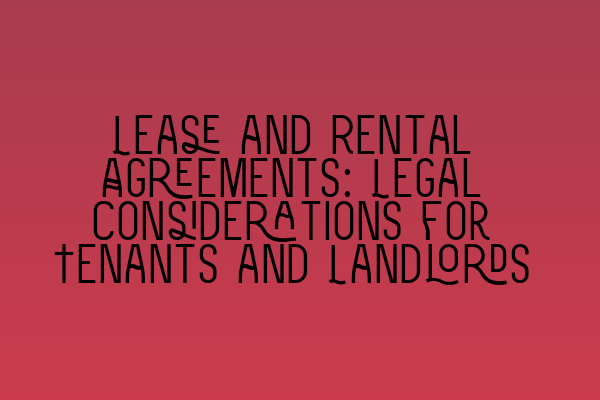**Lease and Rental Agreements: Legal Considerations for Tenants and Landlords**
Welcome to SQE Contract Law, your go-to resource for legal information and advice. In this blog post, we will discuss the important legal considerations that tenants and landlords should be aware of when entering into lease and rental agreements. Whether you are a tenant looking to rent a property or a landlord leasing out your property, understanding the legal aspects of these agreements is crucial to protect your interests.
**Types of Lease and Rental Agreements**
Before we dive into the legal considerations, it’s important to understand the different types of lease and rental agreements that exist. Some common types include:
1. **Residential Leases**: These are agreements between a landlord and a tenant for the purpose of renting a residential property, such as an apartment or a house.
2. **Commercial Leases**: These are agreements for the rental of commercial properties, such as retail stores, offices, or industrial spaces.
3. **Short-Term Rentals**: These agreements are typically used for vacation rentals or short-term stays, often through platforms like Airbnb.
Now that we’ve covered the basics, let’s explore the legal considerations tenants and landlords should keep in mind when entering into these agreements.
**1. Understand the Terms and Conditions**
One of the most important steps for both tenants and landlords is to carefully read and understand the terms and conditions of the lease or rental agreement. This document will outline the responsibilities and rights of each party, including details about rent payment, security deposits, maintenance obligations, and termination conditions. Ensure that the agreement is fair and transparent, and seek legal advice if necessary.
**2. Security Deposits and Property Inspections**
For tenants, it’s crucial to understand the rules regarding security deposits. In many jurisdictions, landlords are required to hold these deposits in a separate account and return them within a certain timeframe after the tenancy ends, minus any legitimate deductions for damages.
Landlords should consider conducting a thorough property inspection both before tenants move in and after they move out. This will help determine any damages and assess whether deductions from the security deposit are necessary.
**3. Maintenance and Repairs**
Maintenance and repair obligations should be clearly defined in the lease or rental agreement. In residential leases, landlords are typically responsible for maintaining the property’s structural elements, while tenants are responsible for day-to-day maintenance, such as keeping the property clean.
For commercial leases, the division of maintenance and repair responsibilities may vary depending on the specific agreement. It’s essential to clearly outline these responsibilities to avoid potential disputes.
**4. Rent Increases and Lease Renewals**
Rent increases and lease renewal terms should be stated in the agreement. In many jurisdictions, landlords must provide notice of any rent increase a certain number of days or months in advance, depending on local laws.
Similarly, lease renewals should be addressed in detail. Tenants should be aware of their rights regarding lease renewals and any conditions or requirements that must be met to qualify for renewal.
**5. Termination and Eviction**
Understanding the procedures for termination and eviction is important for both tenants and landlords. Lease and rental agreements should outline the circumstances under which each party can terminate the agreement, including notice periods.
In the unfortunate event that eviction becomes necessary, it’s crucial to ensure that the eviction process is carried out in compliance with local laws and regulations.
**6. Seek Legal Advice**
When in doubt, seek legal advice. A solicitor specializing in contract law can provide valuable insight and guidance, ensuring that your lease or rental agreement is fair, compliant, and protects your rights and interests.
For aspiring solicitors looking for mentorship, we recommend checking out our article on Mentorship for Aspiring Solicitors: Nurturing Talent in the Legal Field.
To gain a better understanding of the legal system and its complexities, navigate through our article on Legal Challenges and Pitfalls: Navigating the Complexities of the Legal System.
If you’re considering a career as a solicitor and want to learn more about the Graduate Diploma in Law (GDL), check out our article on The GDL (Graduate Diploma in Law): A Pathway to Becoming a Solicitor.
For tips on preparing for your journey to becoming a solicitor, read our article on Mastering the Solicitor’s Path: Prepare for the Journey Ahead.
Finally, if you’re interested in the benefits of a career as a solicitor, our article on The Benefits of Becoming a Solicitor: A Rewarding Career will provide valuable insights.
At SQE Contract Law, we are committed to providing comprehensive information and guidance to help you navigate the legal landscape. Feel free to explore our website for more legal resources and articles.
Remember, understanding the legal considerations of lease and rental agreements is essential for both tenants and landlords to ensure a smooth and fair transaction.
